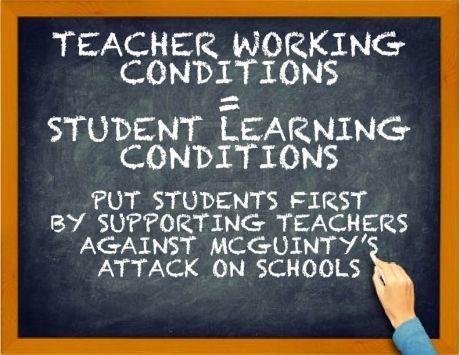Shared
You are here
Ontario teachers and students step up the fight against austerity and Bill 115

December 7, 2012
On Monday, Ontario teachers will start rolling walkouts across the province against the draconian Bill 115, the "Putting Students First Act." But the best way to put students first is to support teachers against the Liberal government's anti-democratic austerity agenda.
Austerity
The Ontario Liberals claimed Bill 115, passed in September, was necessary in order to balance a budget during the economic crisis. But this is after McGuinty wasted billions of dollars in corporate tax cuts. While the 1 per cent has been bailed out, the 99 per cent are facing cuts -- from imposing a pay freeze on teachers, denying universal childcare to parents and continually raising tuition for students.
Students have been at the heart of the fight against the Liberal's austerity agenda, including occupying the office of Glen Murray, Minister of Training, Colleges and Universities. As Cindy Brownlee, Director of Education and Equity for the Student Association of George Brown College said last April, "As a single mother nearing the end of my studies in early childhood education. I've joined today's occupation to demand that the Ontario government reverse their decision to increase tuition fees next fall."
In addition, students are not abstract or frozen-in-time. As one writer put it, "Today's high-school student without sports is tomorrow's college student racking up debt and next week's angry, unemployed or precarious worker."
Teachers are putting students first by resisting the austerity agenda that is undermining their futures.
Democracy
In addition to imposing a pay freeze and removing sick days, Bill 115 strips teachers of their democratic rights to collective bargaining, and gives control to the Education Minister of the austerity-driven government. As one legal expert put it:
"You do not have to be a constitutional lawyer to conclude that this proposed legislation is an unprecedented attack on the civil liberties and constitutional rights and freedoms of educational workers. We should expect our governments to defend our constitutional rights and freedoms and to respect the constitutionally protected process of good faith bargaining between school boards and educational worker and teacher unions."
Instead, Ontario Premier Dalton McGuinty broadened the attack on democracy from collective bargaining to social democracy. Proroguing the Ontario legislature is part of a pattern of undermining democracy to advance the austerity agenda -- from the federal Tories proroguing Parliament and imposing omnibus bills, the BC Liberals suspending the legislature amidst their campaign against teachers, and the Quebec Liberals imposing Bill 78 to attack the student movement.
Solidarity
The Ontario Liberals accuse the teacher strikes of harming students -- just like transit strikes are accused disrupting passengers and nurses strikes are accused of harming patients. This is a time-honoured, divide-and-conquer strategy to scapegoat workers for cutbacks: cut jobs and services, and then when service providers resist, blame them for the disruption and pit them against service users. But it doesn't always work.
The Tories are calling for firm action against teachers, but the vacillation of the Liberals show they have a better sense of popular opinion -- like the repeated waves of high school walkouts in support of teachers. At the end of September high school students also organized a rally at Queen's Park.
As grade 12 organizer Kayla Smith said "I have a message for Mr. McGuinty: repeal Bill 115. It bans the right to strike, it freezes the wages of teachers and cuts their benefits. There was no negotiation, there was no collective bargaining. Teachers feel disrespected and that is what we want to say today: you have to respect the teachers, negotiate and not just impose demands on them."
The same weakness that drove the Liberals to prorogue the legislature is making them ambivalent about their own legislation. McGuinty recently claimed that “teachers have a democratic right to strike in the province of Ontario,” -- after revoking that same right -- while contenders for the next leadership have criticized his attacks on teachers (though not promised to revoke it).
Education Minister Laurel Broten has narrowed the blame to union leaders -- which is ironic since the union bureaucracy has been trying to negotiate with the prorogued government, and its rank-and-file teachers whose rejection of tentative agreements set the stage for job action.
Rank-and-file
Rank-and-file activity and mutual community support are critical ingredients in resisting austerity -- as recent victories show. Rob Ford went after library workers, but because they had built a campaign around protecting library services they received widespread support and pushed back against the worst of job cuts -- protecting the services those jobs provide.
When Charest imposed Bill 78 on students, the Quebec student strike responded by broadening the movement to include all those concerned about basic civil liberties -- isolating the government in the process. Students didn’t wait for the next election, they mobilized picket lines and protests and reached out to the broader community. Through the process, teachers joined the movement -- from marching in demonstrations to strengthening picket lines -- which got rid of the government and its hated Law 78.
When Chicago's Democratic mayor Rahm Emanuel went after teachers, they didn't wait for the end of the election. In the midst of the election, they mobilized the networks with parents and students they had built over previous years, and launched a confident strike to defend public education -- and they won.
These three victories began years before the strikes, with rank-and-file organizing and outreach. Ontario teachers don’t have the same structures in place, but the high strike votes and high school walkouts have created the potential of building a broad movement to defend public education and the good jobs that provide it.
To put students first, we should join them and their teachers in walkouts, and join with everyone else at the January 26 protest outside the Liberal party convention.
This article was originally published by Rabble.ca
Section:
- Log in to post comments










